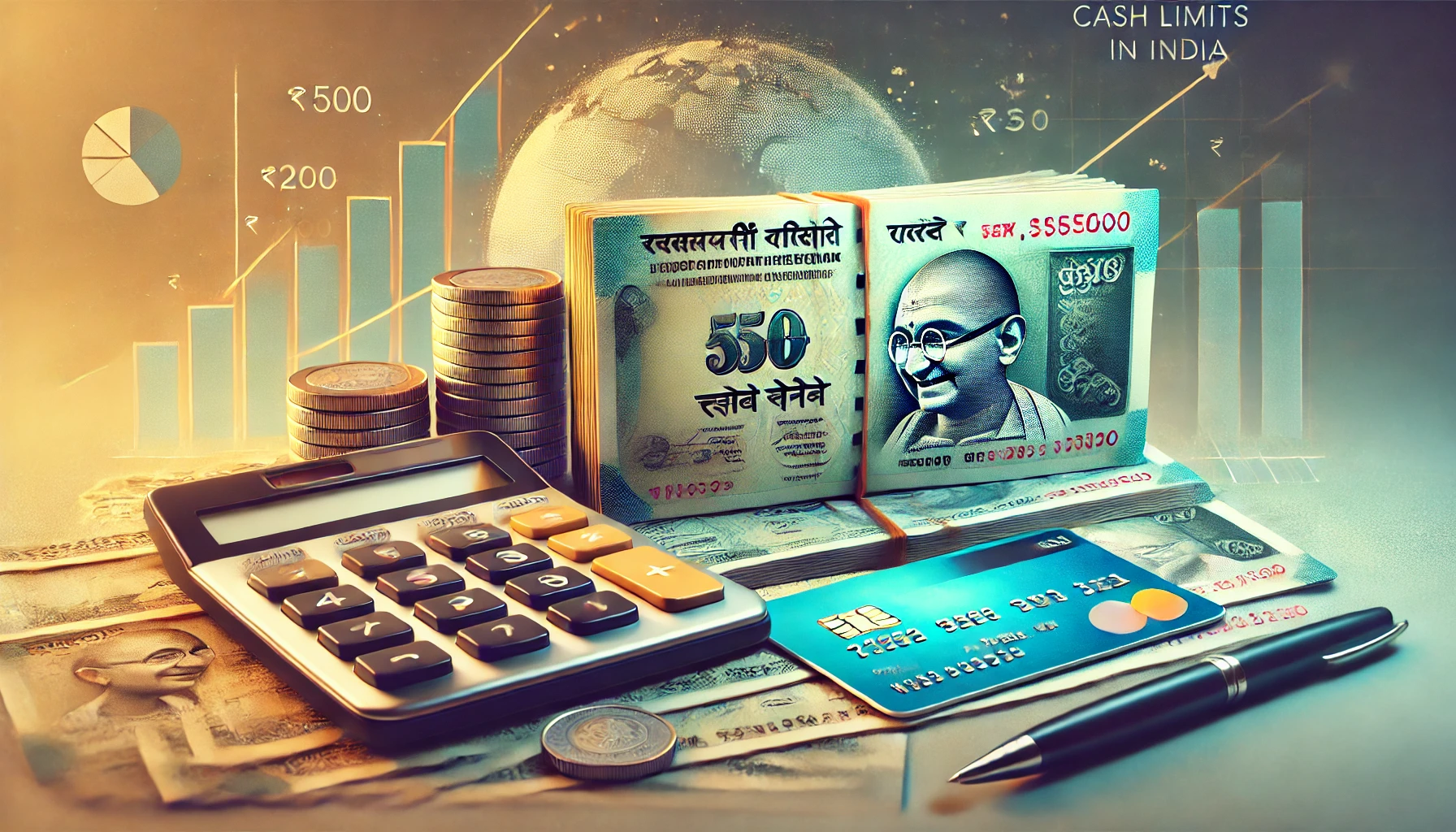🏠 How Much Cash Can You Keep at Home?
There is no official limit on how much cash you can keep at home. However, if the Income Tax Department finds a large amount, you must be able to prove its legal source. If you can’t, the authorities may seize the money and impose penalties. So, keep records that prove where the cash came from.
💼 Cash Transaction Limits Under the Income Tax Act
The Income Tax Act of India sets several limits on cash transactions to curb black money and promote digital payments. Below are the key sections that govern these cash limits:
1️⃣ Section 269ST – Cash Receipt Limit
- 🚫 Limit: No one can receive cash of ₹2 lakhs or more:
- In a single transaction.
- In aggregate from a person in one day.
- For a single event/occasion from one person.
- ⚠️ Penalty: If you exceed ₹2 lakhs, the penalty is 100% of the amount you received in cash. For example, receiving ₹2.5 lakhs in cash will result in a ₹2.5 lakh penalty.
2️⃣ Section 40A(3) – Cash Payment Limit for Expenses
- 🚫 Limit: No cash payments above ₹10,000 can be claimed as tax-deductible expenses.
- 💡 Tip: Payments over ₹10,000 must be made through bank transfers (e.g., cheque or electronic payment). If you pay in cash, the expense won’t be allowed as a deduction.
3️⃣ Section 269SS – Cash Limit for Loans & Deposits
- 🚫 Limit: Cash transactions for loans or deposits cannot exceed ₹20,000.
- ⚠️ Penalty: If the limit is exceeded, the penalty will be 100% of the amount received.
💡 Additional Cash Transaction Restrictions
- 🏡 Property Transactions: Cash payments for property deals above ₹20,000 are illegal and will incur penalties.
- 💵 Donations: Cash donations above ₹2,000 to registered trusts or political parties are prohibited.
- 🏦 Bank Transactions: Deposits above ₹10 lakhs in a year from savings accounts will attract scrutiny under TDS provisions.
📊 Summary of Penalties
| Violation Type | Limit | Penalty |
|---|---|---|
| Cash Receipt | ₹2 lakhs | Equal to the amount received |
| Cash Payment for Expenses | > ₹10,000 | Disallowed as deduction |
| Loan/Deposit | > ₹20,000 | Equal to the amount received |
| Property Transaction | > ₹20,000 | Equal to the amount paid |
| Donation | > ₹2,000 | Violation of tax laws |
✈️ How Much Cash Can You Carry While Traveling?
When traveling within India, there is no fixed limit on carrying cash. However, if you carry more than ₹2 lakhs, you need to provide proof of the source of funds. Keep documents like:
- 💳 Withdrawal slips
- 📜 Business records
- 💼 Receipts or invoices (for traders)
🚨 Election Period: During elections, the movement of large amounts of cash is strictly monitored. Be ready to explain the source.
🏢 Cash Transactions in Real Estate
- 🚫 Limit: Cash payments above ₹20,000 in real estate deals are illegal.
- ⚖️ Penalty: Both the buyer and seller will face penalties.
- 🏦 Government Encouragement: The government promotes bank transactions for transparency and to reduce black money.
🏦 Banking Rules for Cash Withdrawals & Deposits
- 💳 PAN/Aadhaar: Required for cash withdrawals above ₹50,000.
- 🏦 Deposits > ₹10 Lakhs: Cash deposits exceeding ₹10 lakhs in a year from savings accounts will be scrutinized under TDS provisions.
- 💻 Digital Payments: The government encourages electronic payments to reduce cash dependency.
💸 Tax Implications on Seized Cash
If cash is seized and you can’t explain its source, the tax implications are severe:
- 60% tax on the seized amount.
- 20% surcharge.
- Cess applied.
- Total Tax Burden: 78% of the seized cash.
👩🦰 Special Considerations for Women’s Savings
Many Indian women save cash from household expenses. If they can prove the legal source of their savings, they may receive tax relief. However, large amounts must be explained to avoid penalties.
✅ Best Practices for Managing Cash
- 📚 Keep records for all cash transactions.
- 🏦 Use banking channels for large payments.
- 📊 Declare cash income in tax filings.
- ⚖️ Follow banking and tax regulations carefully.
📝 Conclusion
Understanding cash transaction limits is essential to avoid penalties and stay on the right side of the law. By following these guidelines, you can ensure that your financial practices are transparent and compliant. If in doubt, always consult a tax professional to guide you through the complexities of cash transactions.

Hi, I’m Vishal
Founder of FinTaxExpert.in, with 7+ years of experience in taxation, audits, and corporate finance.
✍️ I’m passionate about writing and researching in the fields of taxation and finance.
📖 Learn more about us at FinTaxExpert.in.

